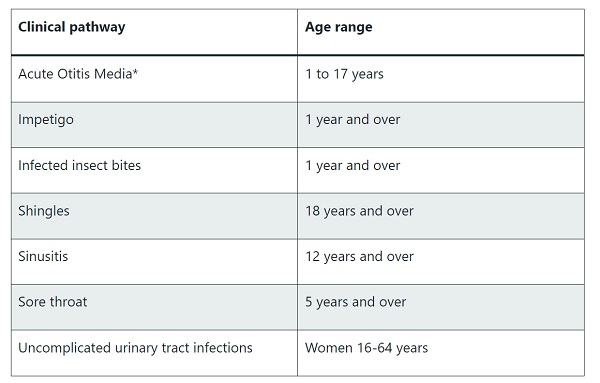Pavilion Publishing and Media Ltd
Blue Sky Offices Shoreham, 25 Cecil Pashley Way, Shoreham-by-Sea, West Sussex, BN43 5FF, UNITED KINGDOM
The new Pharmacy First Service launches this week that allows community pharmacists to treat seven common conditions without the need for the patient to visit their general practice.
NHS England hopes this will save up to 10 million general practice team appointments a year and help patients access quicker and more convenient care for conditions such as sinusitis, sore throat, earache, infected insect bite, impetigo, shingles, and uncomplicated urinary tract infections in women (under the age of 65).
Pharmacists will follow specific clinical pathways that were developed with input from a group of multi professional experts, including practising clinicians, antimicrobial resistance specialists, and representatives from national organisations. They have been approved by the National Medical Director at NHS England and the Chief Medical Officer for England.

More than nine in ten community pharmacies in England – 10,265 in total – are taking part of the scheme, which is part of the NHS and government’s primary care access recovery plan. It builds on the expansion of the contraceptive pill service in December 2023, with more than 5,000 pharmacies now registered to offer women the chance to get a supply of oral contraception over the counter from their pharmacy without needing to first see their GP.
The Government has made £645 million of new funding available to support the continued expansion of community pharmacy services.
Chair of the Royal Pharmaceutical Society in England, Ms Tase Oputu, said: “Pharmacy First is a leap forward in improving patient care by making treatments for a range of conditions more accessible from community pharmacies.
“The expansion of clinical services not only empowers patients with greater choice on where and how they receive care, but also makes the most of the valuable skills of pharmacists and their teams. Pharmacy teams have made an incredible effort to get the service ready alongside all the additional pressures they face. It’s an exciting transformation, helping to reshape the landscape of primary care.”
What will this mean for general practice?
To streamline and improve workflow, NHS England have redesigned the way that pharmacy consultation outcomes can be captured in the patient record. This will roll out throughout February 2024 and will mean that practice staff can review consultation information and add the data to the patient record with one click of a button.
Until this functionality is rolled out, practices will continue to receive information through NHSMail in line with existing processes.
NHS England are drafting a separate operational note to further support general practice and primary care networks. This will be available before the launch of this service.
Need campaign to build trust in Pharmacy First
Research has been commissioned by the National Institute for Health Research (NIHR), for a robust, wrap-around evaluation of the planned Pharmacy First service to understand the impact, safety, cost effectiveness and acceptability of these services, as well as any implications for antibiotic use and antimicrobial resistance.
Healthwatch England said it will take time for pharmacists to get trained and ready for change. Patients and GP services will also need up to date information on which of their local pharmacies are offering direct supply of medicines for one, some, or all seven of the new conditions.
Louise Ansari, Chief Executive, Healthwatch England, said: “”Investment in a national campaign to raise awareness of the new services and build trust in pharmacists will also be essential and, crucially, this will need to reach all communities to be effective.
“As with access to the contraceptive pill announced last month, patients will welcome the extension of pharmacy services to include common conditions. It will offer them greater flexibility and provide a safe alternative to seeing a GP, which we know remains a real challenge for many people across England.”
Latest NHS England figures show that last November was the busiest on record for GPs and their teams, who delivered more than 31 million appointments – a 30% increase on 2019. Concurrently, latest workforce figures reveal that the profession has lost 642 fully qualified, full-time equivalent GPs. The average number of patients per GP in England is now an eye watering 2,290.
The news follows a poll commissioned by the Royal College of GPs that found over three quarters of the public (78%) supported more funding for general practice if it would reduce appointment waiting times, with 84% believing the next government should increase the number of GPs to make it easier to book an appointment. Overall, 83% of respondents said they wanted to see action from the next government on access, and two thirds (66%) said that it was important to them to be able to book a GP appointment with a health professional they have met before.


